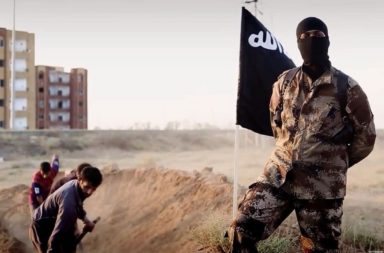After months of meetings and overtures to one another, it appears that the government and Silicon Valley have once again come together, in the face of present conflict, to coordinate counterterrorism efforts.
Unexpected though it was, given the recent court order requiring Apple to facilitate the compromise of its security features, the meeting appears to have led to a number of positive outcomes.
The Justice Department facilitated the meeting of technology companies on Wednesday, calling together executives from Facebook, Twitter, Apple and a range of other social media and digital businesses, aiming to facilitate a dialogue on ways to counter ISIS messaging.
The ISIS social media presence has been observed in recent years to be a real and present danger to Western society, summoning lone-wolf actors across a range of countries and drawing upon high-tech, modern methodologies to encourage violent action against the West.
ISIS has already shocked the world on a number of occasions, claiming responsibility for attacks in Paris, San Bernardino and a number of other locations. Yet what seems to be grabbing the attention of the Obama Administration is their tactics for achieving such ends.
With high quality, Hollywood-esque imagery and videos production, shot in multiple languages with the use of emotive and sophisticated music, the videos being released by the terror group appear to indicate an erudition that terror groups have not shown until now.
Shortly after the attacks in Paris, ISIS again captured the word’s attention, with its use of sophisticated and shocking video footage. A film depicting a prospective terror attacker was released, revealing a man who appeared to be preparing himself for another horrific incident. But this time, the video was set in Times Square, New York.
No such attack has as yet come to pass. Nevertheless, this heightened the concerns of security analysts and resulted in greater scrutiny being placed on the fight against ISIS.
In contrast to this, the State Department’s counter terrorism campaign has been lampooned for a notable lack of creativity. “Think Again, Turn Away” has been mocked for its content as well as its branding, with security experts noting that it isn’t currently reaching its intended population, nor is it having the desired effect.
As analysts have noted, prospective ISIS recruits are unlikely to heed advice from the American government in the first place. However, were they to do so, they certainly wouldn’t follow advice under a long, clunky name such as “Think Again, Turn Away”.
This is why the Obama Administration has been moving to reboot its security efforts. The talks this week were hardly the first, with the government reaching out to an otherwise distanced Silicon Valley, on multiple occasions between last year and today.
Wednesday’s talks saw the participation of almost fifty technology companies and related community groups, as well as a number of US government agencies and allied groups who led a briefing on ISIS social media messaging. The briefings also focused on formulating a cohesive counter narrative, drawing upon optimistic messaging and aiming to attack the image that ISIS has successfully cultivated for itself on social media.
The move to rethink the administration’s counter-terrorism strategy has been welcomed by many. With a notable increase in the focus on security measures, observers across the world over are keen to see that efforts are made in the most effective way possible to counteract ISIS.
Young, disenfranchised youths appear to be finding ISIS and al Qaeda messaging to be more appealing now than ever before, making it clear that the government’s strategy is not working. Moreover, it’s been clear for some time now, that the messaging of many terrorist organisations is.
The first step in this fight is acknowledging there is a problem. And with State Department under secretary for public diplomacy and public affairs Richard Stengel acknowledging that “it’s a big challenge for government because government doesn’t always move rapidly and nimbly”, it appears that this administration is aware of the challenge it faces.
Taking on a new messaging strategy by partnering with Muslim countries from the United Arab Emirates to Malaysia, and reaching out to former radicalised Muslims and various non-governmental organisations, the Obama Administration has truly decided to reinvent its counter-terrorism strategy. The administration is now looking to non-governmental sources to counter the ISIS message, and it’s looking at different narratives that it can utilise to do so.
Working with Muslim-dominated countries and former radicalised youths aims to counteract the message that ISIS espouses. Namely, that the United States is against the Muslim world and against Muslims more generally. This is a message that has had particular success in the wake of Donald Trump’s presidential bid, and it is something that the government looks to be contending with on a daily basis.
Previously, social media corporations such as Twitter have been criticised for not being proactive enough in the fight against terrorism, despite Twitter alone having shut down 125,000 ISIS-related accounts. This recent action by Twitter was seen as a response to the Government’s request for greater assistance, coming only one month after officials from the Obama Administration travelled to Silicon Valley in an attempt to lobby technology firms to join the fight against ISIS.
Clearly, the government knows that a new fight is needed, and it’s looking to its allies in the business community to help take up the fight.
In the wake of the recent court order against the government, relationships appear to have been strained. Both the government and Apple have been competing for public attention in order to present their version of events, and this is not conducive to a productive working relationship.
Apple CEO Tim Cook recently gave his first interview on the matter, describing the request by the government as the Information Technology equivalent of “cancer”, and he promised to seek a meeting with President Barack Obama.
And this fight isn’t a new one either. After the Paris attacks, it was discovered that the terrorists had been using encrypted messaging software, a result that FBI Director James Comey had foreshadowed at repeated Congressional hearings. Comey had warned of the increasing difficulty of monitoring dangerous online materials, and the government looked to be analysing how best to use social media and digital corporations in its fight against terrorism.
While it appears that Apple will do everything in their power to maintain current security arrangements, the relationship is still far from breaking point. That Apple were invited and intended these recent meetings indicates that the Obama Administration and Silicon Valley continue to see the use in maintaining productive, warm relationships. Moreover, it is possible for these two to continue to fight on particular detailed issues such as the security arrangements of the phones of the San Bernardino shooters, without compromising their broader relationship.
The hit of the reset button on the Obama Administration’s counter terrorism strategy is a welcome move. ISIS have been winning the fight on social media for too long. And with a simple glance of the efforts of government agencies on social media, it’s not hard to see why. That the administration has chosen to enlist the help of business is also a welcome change. The government knows its own limitations and it sees ways that business can help to get around this.
Yet this isn’t the end by a long shot. The government has hit reset, and it has gone about doing it in just the right way. But with a number of challenges on the political horizon, including a change of president, a highly antagonistic race and any number of unforeseen security threats, this issue is far from resolved.




